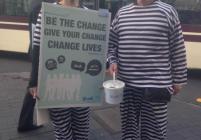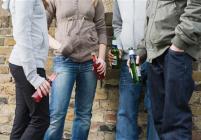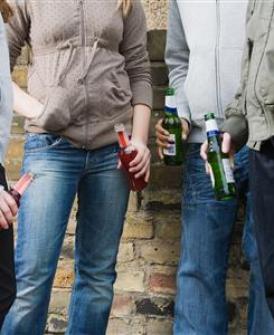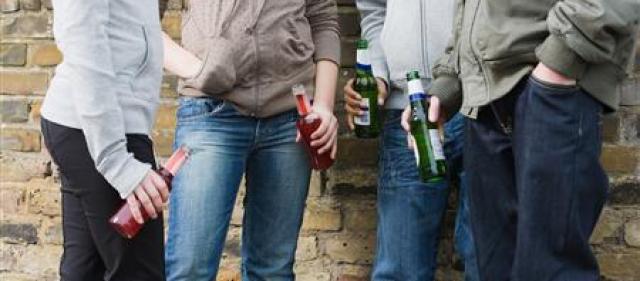Alcohol
Alcohol
Topics in this section:
- What is alcohol?
- Who's counting?
- Alcohol and you
- Hangovers
- Drinking and driving
- Worried about the impact of alcohol
- Getting help around alcohol
What is alcohol anyway?
Alcohol, technically speaking, is a chemical compound, formula = C2H5OH. Most of the family of alcohols are totally poisonous to the human body, but the kind we drink, called ethyl alcohol, is tolerable in small amounts.
Where does it come from?
Alcohol comes from fruit and vegetables that are fermented (left to rot) with sugar, water and yeast. Over time, this unattractive mixture produces carbon dioxide (the bubbles) and alcohol.
When it reaches critical mass (the strongest it can get) at 15% alcohol, the alcohol starts to kill off the yeast. This means that any drink with a higher percent has had extra alcohol added, usually through distillation.
How does alcohol work?
- Alcohol isn't like a food and your body knows this so treats it differently.
- Food gets broken down before it reaches your bloodstream; very little alcohol does.
- An enzyme in your stomach called alcohol dehydrogenase starts the process. So minutes after you have downed a drink, your blood is sending the alcohol to every part of your body.
- As it travels, the alcohol slows down the work of your body's cells, especially in the brain. You can feel this happening.
- One of the places it travels to is your liver. It's the one place where your body can change the alcohol. Your liver uses enzymes to break it down into H2O (water) and CO2 (carbon dioxide). Your liver works hard but slowly, it takes one to two hours to break down one drink.
- So if you drink faster than your liver can cope, the alcohol hangs about and messes with your brain.
Who's counting? How much is too much?They haven't been able to come up with any guidelines for young people so take your cue from the recommended alcohol limits for adults.
Ministry of Health guidelines state to prevent long term health problems, adults should drink four standard drinks or less on one occasion.
Let's face it. Most people don't measure drinks at parties, so it pays to remember people usually serve drinks bigger than the standard sizes.
It takes our bodies an hour to process one standard drink. (So think about it... if you have 10 standard drinks, its 10 hours for your body to fully process the alcohol!)
It’s also important to know your alcohol limits when driving – check out our Drinking and Driving section.
What is a 'standard' drink?
- One can (330ml) of beer
- One measure of spirits
- One small glass of wine (100ml)
Tips:
Check the standard drinks measure on your alcohol bottles as a way to keep track of how much you are drinking.
Did you know there are 3 standard drinks in a shot glass of 40% spirits?
Before you drink there's some important information you should know.
You've got big plans ahead relaxing with your mates. Chances are alcohol will be on offer. Help yourself handle alcohol better by using these tips:
- Eat before you party, and while you party.
- Eating slows the rate alcohol gets absorbed into your body.
- Kick-off partying with a non-alcoholic drink.
- Pace yourself. Spread your drinks over time. Try not to throw them back to back like there's no tomorrow.
- Drink both alcoholic and non-alcoholic drinks. Ideally one for one.
- Have lots of water while you're drinking and as much as you can stomach before you go to sleep. That way you'll avoid the dry horrors. If you are dancing you'll dry out faster, so keep up the water.
- And remember- it's okay to not drink at all! No one can make decisions for you, and true friends will respect the choices you make.
It’s important to let your caregivers know where you are when you’re drinking. - If you choose to drink alcohol – drink with people you know and trust.
- Have a sober driver organised or someone who can collect you from the party.
- If you’re stuck at a party and want to go home but also don’t want friends to know you want to leave – have a code word with the person collecting you which means they get you straight away no questions asked.
What are we drinking?
Most Kiwis drink Beer, Wine, RTD’s and Spirits.
- Beer contains around 5% alcohol
- Wine contains approximately 12%
- RTD(Ready To Drinks) contain anywhere from 4-9% alcohol... did you know many RTDs contain large amounts of sugar and caffeine?
- Spirits can be up to 40% alcohol.
Did you know that New Zealander's spend $85 million a year on alcohol alone? (Interesting huh... Especially as we only have a population of 4 million!)
How much are Kiwi teen’s drinking?
According to the Youth ’12 Survey, a study of high school teens conducted by the University of Auckland:
- 57% of students have tried alcohol
- 45% of students currently use alcohol
- 8% of students drink on a weekly basis
- 23% of students report binge drinking
So, you've had a great night out with the gang. Everybody has had a good time and has stumbled home to bed. Ahhh... it feels so good to crash out, but why do you feel so bad in the morning?
Hangovers- What causes all that suffering?
The exact cause of hangovers is not totally understood, although the pounding headache is caused by dehydration. The other symptoms - like throwing up, feeling sick or depressed and general grouchiness - are most likely caused by all the other stuff that goes into drinks.
Dehydration
Basically unless you drink heaps of water, alcohol is gonna make you dehydrated. The cycle goes a little something like this:
1. You drink lots of alcohol, you don't drink any water.
2. Your body freaks out and alerts your kidneys.
3. Your kidneys work harder and faster – causing all those hangover symptoms.
Important safety information!!
Alcohol effects our bodies in many different ways... it can make us feel happy and confident, energetic, tired, angry or depressed. This can depend on our body, mood, situation, environment and even the type of alcohol.
Alcohol impairs judgement, meaning people often make choices in which they usually wouldn’t – putting themselves or others at risk.
Did you know that alcohol is the one of the biggest factors in domestic violence, sexual assaults and hospital A&E visits?
If someone is passed out at a party, it is important to put them into the recovery position. This will keep them safe and stop them from choking on their own vomit. Check out this picture that shows how it works:

Those six steps basically break it down for you, but it’s important to use your own judgment and make sure to keep the person safe. You might think there’s a chance you’ll get in trouble if you call 111, but if your friend is passed out and not responding, then they could be in trouble. The paramedics don’t care about the party, they only care about keeping your friend safe. And what’s more important in the end? Not getting in trouble or possibly saving your friend’s life?
Note: If your mate is in the recovery position, keep checking on them to make sure they are breathing – do this by giving them a quick shake or nudge to ensure they are getting enough oxygen.
We’ve all seen the ads on TV and may know someone who’s been involved in a car crash where alcohol was a contributor...
If you make the decision to drink more than your legal limit, and then get behind the wheel of a car, you should make sure you are big enough to accept the possible ugly consequences of your choice. Things like losing a best mate, injuring a relative, killing someone’s kid, or maybe losing your ability to go to the toilet on your own. It's all pretty sobering stuff.
Drinking alcohol and driving is dangerous because drinking alcohol slows your reflexes down, causing you to react more slowly than usual. Obviously the best thing for you, your mates, family and strangers is that you don’t drink at all if you’re going to drive.
Taking turns to be the designated sober driver is a good way of keeping everyone safe. Otherwise, pooling some cash amongst your friends and putting this aside when you go out partying can mean that a cab ride home is affordable.
The amount of alcohol you can drink before you are over the limit depends on many things such as:
- Your age
- Weight
- Body size,
- Gender
- What you’ve had to eat that day
- Whether you are tired
- Or have taken any medicine that might increase the effect of the alcohol.
If you drive, and are under the age of 20, make sure you are up to speed on the recent changes to the legal drink drive limit:
... The facts:
The legal drink drive limit for drivers under 20 has changed from 0.03 Blood Alcohol Concentration (or BAC) to zero. This is part of a government strategy to make the roads safer, as young people are at high risk of death or serious injury from road crashes in New Zealand – and for a significant portion of these, drink driving is a factor. BAC 0.03 is the same as 30mg alcohol per 100 ml blood or 150 mcg alcohol per litre breath.
If you are under 20 and have to go through the alcohol-testing process and are found to have a blood alcohol concentration level over zero, you will have to go to court. If you are found guilty you can be fined up to $2,250 or face imprisonment for up to three months; In addition you will be disqualified from driving for three months or more.
If you are over 20, you can drink a small amount of alcohol and be able to drive. If you come in at over 0.08 you will have to go to court. If you are found guilty by the court, the penalties are increased to a fine of up to $4,500 or imprisonment for up to three months. In addition you will be disqualified from driving for six months or more. BAC 0.08 is the same as 80 mg alcohol per 100 ml blood or 400 mcg alcohol per litre breath.
If you repeat-offend at alcohol levels beyond BAC 0.08, you may be looking at higher penalties than those stated above.
Additional penalties for high alcohol level offences:
If your alcohol level is higher than BAC 0.13 the Police will immediately suspend your licence for 28 days. This is in addition to any other penalties the court gives you if you are found guilty. BAC 0.13 is that same as 130 mg alcohol per 100 ml blood or 650 mcg alcohol per litre breath.
Don’t ever mix drugs and alcohol before driving. Mixing alcohol and drugs can significantly increase your chances of crashing. You will also be increasing your chances of being picked up by the Police and prosecuted.
Aged 20 years or over:
If you are aged 20 years or older, the maximum penalties for a first or second offence are a fine up to $4500, or a maximum of 3 months imprisonment, and losing your licence for a minimum of 6 months. If you re-offend a third time or more, the fine can be as high as $6000 or a maximum prison term of 2 years and a disqualification from driving for more than one year.
If you kill or injure someone while drink driving, the penalties are much greater – a maximum 5 years in prison or a fine not exceeding $20,000 fine and disqualification of your drivers licence for at least 1 year. In extremely serious cases involving the killing of another road user, the Police could charge you with manslaughter. If you are convicted of manslaughter, you could be up for a very long prison sentence.
The Police also have the power to immediately suspend your driver licence (for 28 days) if you are caught driving with a breath alcohol level exceeding 650 micrograms per litre breath or a blood alcohol level exceeding 130 milligrams per 100 ml blood. This is more than four times the limit that applies to under 20 year old drivers.
If the offence is your second offence within four years, the Police can suspend your licence for 28 days at levels beyond the legal limit that applies to drivers aged 20 and over. If it is your third or subsequent offence within four years, the Police can suspend your licence for 28 days and impound your vehicle for 28 days if you exceed the breath or blood alcohol level that applies to drivers aged 20 and over. These sanctions are additional to any other penalties that may be imposed by a court if you are convicted of the offence.
So aside from losing your licence after all your patience and perseverance involved in getting it, you also need to be willing to lose people’s trust in you, freedom to get around and ability to hang out with people you like, doing the stuff you enjoy. Other realities include possibly losing your job, friends and facing criminal charges all because you chose to have that extra drink and then drive.
IMPORTANT NOTE: Make sure to consider your standard drinks... even if you do the right thing and wait til the next day to drive after a night out – you still may be over the limit. Your body can only process one standard drink per hour so if you have had 12 standard drinks over a night – that’s 12 hours for you to be back to zero. Check out our alcohol and you section for standard drink information or head to www.alcohol.org.nz
For more information check out: http://www.nzta.govt.nz/resources/roadcode/about-limits/alcohol-and-drugs-limits.html
It can be really hard and stressful when a parent, stepparent, grandparent, friend, sibling, or anyone else in our lives, has a drinking problem. Recognising it can be tricky and not knowing what the next step might be can be tough.
Here are some questions you can consider when thinking about those you care about and alcohol:
- Are you worried about their drinking habits?
- Do you feel that they should cut down?
- Do they feel angry or irritated when someone mentions something about their drinking?
- Have you ever noticed them feeling bad or guilty about their drinking or behaviour while drinking?
- Have you ever noticed if they need a drink when they wake up in the morning to get ready for the day, calm their nerves or get rid of a hangover?
If you’ve answered “yes” to any one of these questions this may indicate that there is a possible alcohol problem. If there is more than one yes, it shows that a problem is highly likely. Another way you check this out is by taking the "Is your drinking okay?" test.
Young people and adults are affected by alcohol in different ways, most young people choose to binge drink, which means heavy drinking, drinking more than you should in a short period of time.
If you think that someone you know might have an alcohol problem, it is important to get support. However, this is often easier said than done! It is important to remember that you can’t force them to get help except in certain circumstances, such as a traffic violation or in an arrest which results in court-ordered treatment. However, you don't have to wait for someone to "hit rock bottom" to do something.
Issues with alcohol are definitely not black and white- it affects the person addicted and those close to them in many ways, and with it may come questions, uncertainty, lies and tears.
Approaching our loved ones who may be struggling with these problems is not an easy thing to do, and at times it may not feel like it is possible to do. But if you are able to approach someone you’re worried about, here are a few tips that might be useful to take:
Your approach: Remember, you are approaching this person out of care and concern; it is not an attack or an intervention. Take it slowly, talk to them one on one, be open and honest about your concerns, but be careful to avoid labels or judgments, and allow the other person room to talk and respect them by listening to their point of view.
Carefully choose a time and place: Finding a place that is safe for both of you to go is important. You could possibly do this at home, or if you are going out, try find somewhere that it was quiet, has limited distractions and no access to alcohol.
Be specific: Tell the person that you’re concerned; that you are worried about them, about his or her drinking and how this may be negatively affecting them and others around them. Use examples of the ways in which the drinking has caused problems, including the most recent incident(s).
Be prepared for a number of responses: The person who you suspect of having a drinking problem, may react to your talk with them in a range of different ways, from total acceptance of what you have said and being on board to wanting to change (best case scenario); to in-between with all the“yeah, I know’s” BUT “it’s not really a problem” or “who doesn’t go out and get wasted from time to time?” or “it’s not like you don’t drink at all”; right through to the person being incredibly shocked, angry, offended and feeling that you have just accused them of being out of control (worse case scenario). We need to be prepared for these reactions and remember that we are only doing this because we care about this person and want the best for them.
What if you cannot talk to this person: If you can’t or don’t feel like you’re able to talk to this person for any reason (maybe it’s your mum or dad, relative, or even a friend that you might be scared of losing over discussing this topic with them), that’s cool, it is NOT your responsibility or your fault that this problem is happening. However, it is important that you let others know about your concerns or about what is going on. This could help to recognise the problem, and avoid further excuses, lies and cover ups. Also by letting others know, you will be able to get support (so you don’t feel so alone), and ultimately begin to try and help the person that you are worried about to get the support that they need too.
If you are or aren’t able to talk directly with the person, the following tips will most probably be incredibly useful to you in getting help and support for your loved one:
Get help: Gather information in advance about treatment and support options in your community. If the person is willing to get help, call immediately for an appointment.
Get others to help you out: Call on a friend / or a family member / or your pastor (basically anyone that you think that your loved one will respect and listen to) to give you a hand with either being involved with talking to them with you, or getting them to talk to your loved one instead of you (this maybe appropriate if it’s someone older than you).
Get support: It is important to remember that you are not alone. Support groups are offered in most communities. These groups hold regular meetings for spouses, family members and children who may be affected by another’s drinking. These groups help family members understand that they are not responsible for a person experiencing problems with alcohol and that they need to take steps to take care of themselves too.
IMPORTANT - If someone or you feel unsafe because of someone else’s drinking or drug taking they/you should call the Police, and if you find someone unconscious call an ambulance, dial 111.
Getting help
Facing up to an addiction can be hard to do, it takes a lot of courage and quitting is often just as challenging.
If you think that you or someone you know needs help read on to find out what some of your options may be.
Youth Health Centres are a good place to go for help.
If you don't have one in your area, talk to an adult you trust, such as your parents, your doctor, Kaumatua or Kuia, a school counsellor or a youth worker or pastor.
You can also get help from an Alcohol and Drug Service (they're listed in the phone book or online) or ring the Alcohol & Drug Helpline on 0800 787 797- a confidential information, advice and referral service for people with questions about their own or someone else's drinking or drug use.
Here’s a few websites where you can find organisations which support young people and families around Alcohol:
www.cads.org.nz
http://www.adanz.org.nz/Directory
http://www.health.govt.nz/your-health/healthy-living/addictions/alcohol-and-drugs
www.alcohol.org.nz

Need to talk to someone?
Kia ora - tamariki ma
Contact us, we are here to help!


























